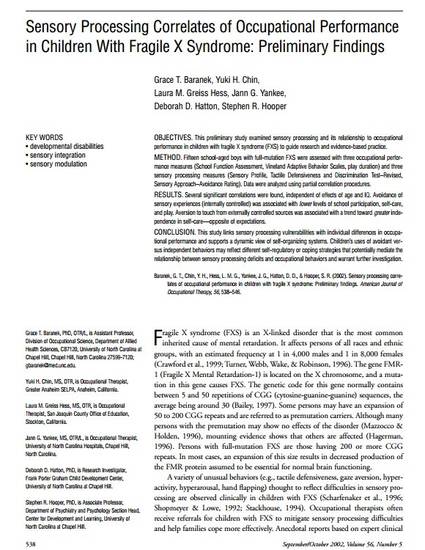
Article
Sensory Processing Correlates of Occupational Performance in Children with Fragile X Syndrome: Preliminary Findings
American Journal of Occupational Therapy
(2002)
Abstract
OBJECTIVES. This preliminary study examined sensory processing and its relationship to occupational performance in children with fragile X syndrome (FXS) to guide research and evidence-based practice.
METHOD. Fifteen school-aged boys with full-mutation FXS were assessed with three occupational performance measures (School Function Assessment, Vineland Adaptive Behavior Scales, play duration) and three sensory processing measures (Sensory Profile, Tactile Defensiveness and Discrimination Test–Revised, Sensory Approach–Avoidance Rating). Data were analyzed using partial correlation procedures.
RESULTS. Several significant correlations were found, independent of effects of age and IQ. Avoidance of sensory experiences (internally controlled) was associated with lower levels of school participation, self-care, and play. Aversion to touch from externally controlled sources was associated with a trend toward greater independence in self-care—opposite of expectations.
CONCLUSION. This study links sensory processing vulnerabilities with individual differences in occupational performance and supports a dynamic view of self-organizing systems. Children’s uses of avoidant versus independent behaviors may reflect different self-regulatory or coping strategies that potentially mediate the relationship between sensory processing deficits and occupational behaviors and warrant further investigation.
Keywords
- Fragile X Syndrome,
- Fragile X,
- FXS,
- development disabilities,
- sensory integration,
- sensory modulation
Disciplines
Publication Date
September, 2002
Publisher Statement
Originally published as Baranek, G. T., Chin, Y. H., Hess, L. M. G., Yankee, J. G., Hatton, D. D., & Hooper, S. R. (2002). Sensory processing correlates of occupational performance in children with fragile X syndrome: Preliminary findings.American Journal of Occupational Therapy, 56(5), 538-546.
Citation Information
Grace T. Baranek, Yuki H. Chin, Laura Greiss Hess, Jann G. Yankee, et al.. "Sensory Processing Correlates of Occupational Performance in Children with Fragile X Syndrome: Preliminary Findings" American Journal of Occupational Therapy Vol. 56 (2002) p. 538 - 546 ISSN: 0272-9490 Available at: http://works.bepress.com/laura_greisshess/9/
